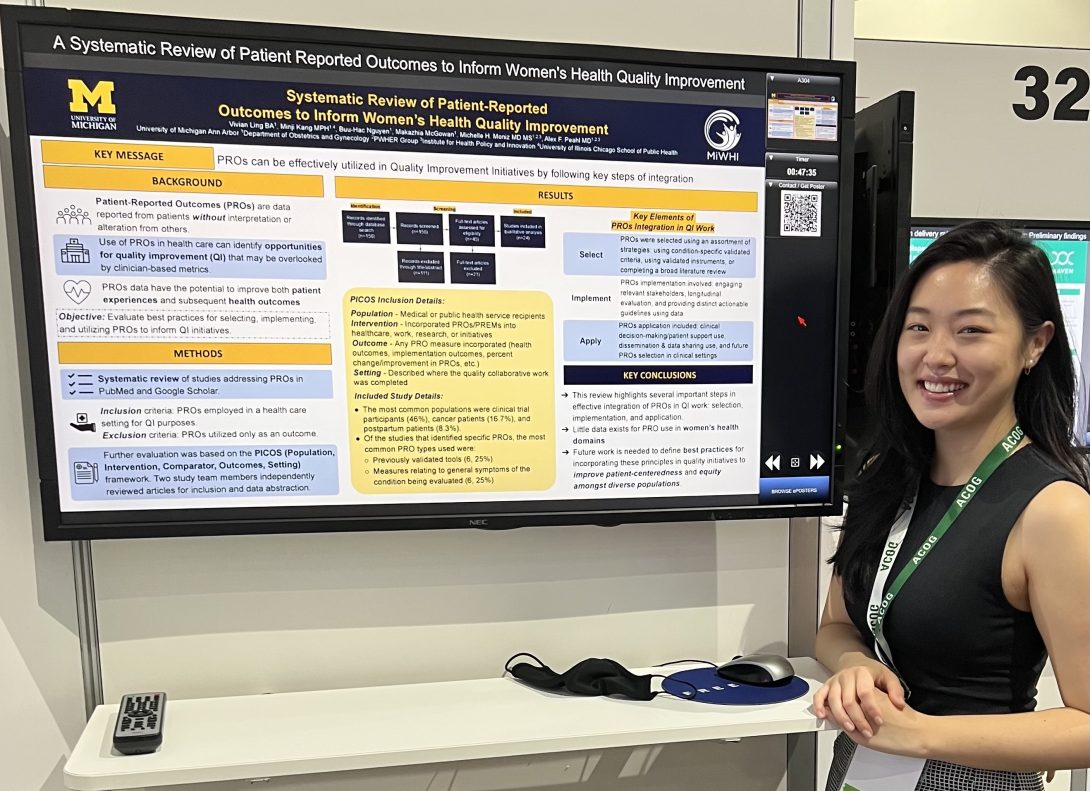Moving toward patient-centered systems in women’s health

Poster session at ACOG supported by P3RC Student Conference Travel Award
Thanks to a Student Conference Travel Award from the P3RC, I was able to attend the 2022 American College of Obstetricians and Gynecologists (ACOG) Annual Clinical and Scientific Meeting. This was my first in-person conference since the start of the pandemic and I was so excited to meet with my colleagues face-to-face.
As it happened, the annual ACOG meeting fell just days after Justice Alito’s draft opinion on Roe vs Wade was leaked and the energy toward advocacy, policy, and reproductive rights was high. One of the interesting sessions focused on how OBGYNs and other professionals could have difficult conversations with those that have opposing views on the restrictive laws and how to navigate a system that may deny delivery of an important health service. The ACOG’s focus on advocacy for health equity was one of the reasons I wanted to attend this conference and it was inspiring to see all of these clinicians and researchers advocating for both their patients and profession.
Systematic Review of Patient-Reported Outcomes to Inform Women’s Health Quality Improvement

The ACOG annual meeting is focused on developing obstetrics and gynecology professionals through education, advocacy, and research. In addition to its focus on advocacy for health equity, I was interested in attending this conference because of its content on delivery of patient-centered care. My team’s research is focused on changing care delivery systems in Women’s Health Quality Improvement through the use of patient-reported outcomes. Patient-reported outcomes are data reported from patients without interpretation or alteration from others. Use of patient-reported outcomes, which are derived from direct involvement with patients, can identify opportunities for improvement that are often ignored by routinely used clinical metrics. As patient-centered healthcare is gaining traction to address healthy inequity, it is important to understand how to involve patients in the design and improvement of their care. The poster I presented, “Systematic Review of Patient-Reported Outcomes to Inform Women’s Health Quality Improvement,” detailed a systematic literature review that identified key elements and best practices in integrating patient-reported outcomes for quality improvement.
Using a Population Intervention Outcome Setting framework, my team and I identified 156 records from two databases. After excluding 132 records through title, abstract, and full text assessments, we completed qualitative analysis on 24 studies. The most common study populations included in the review were clinical trial patients and cancer patients; the most common patient-reported outcomes types used were validated tools and general symptom evaluation tools. Researchers selected patient-reported outcomes using condition-specific criteria, previously validated instruments, or by completing literature reviews. Health system and quality collaboratives that implemented the collection of patient-reported outcomes engaging stakeholders, conducted longitudinal evaluations, and/or provided actionable guidelines for providers. Finally, we found that practical application of patient-reported outcomes included clinical decision-making support, data-sharing, and use of patient-reported outcomes in clinical settings. Though not currently standard in women’s health, our team is looking to advocate for patient-centered quality improvement.
The conference was a wonderful opportunity to highlight important work in women’s health quality improvement and learn about what other professionals in this field are doing to address health equity. My experience at this conference added more fuel to my passion for equitable reproductive healthcare and I cannot wait to go back! Thank you again to P3RC for this amazing opportunity.